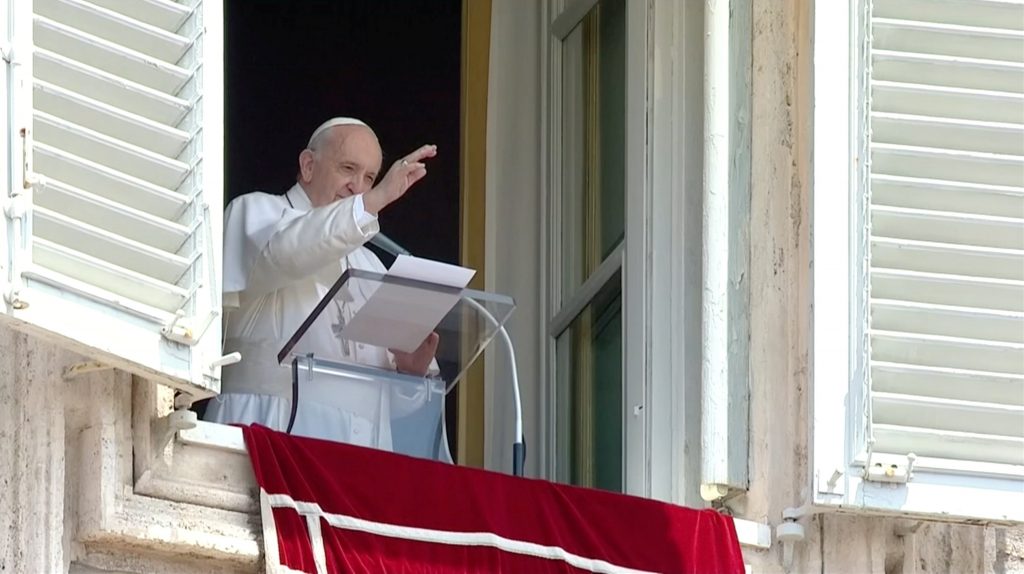
VATICAN CITY. Recovering from colon surgery, Pope Francis briefly ran a fever late July 7, leading his doctors to perform a CT scan of his abdomen and chest the next morning to check for signs of infection.
The results of the scan were negative, as were the results of “routine and microbiological examinations,” the Vatican press office said July 8.
“His Holiness Pope Francis spent a quiet day, eating and moving unassisted,” the press office said in its daily update on how the pope is recovering after undergoing a three-hour surgery July 4 at Rome’s Gemelli hospital.
As with any operation, but especially intestinal surgery, infection is a major post-op concern.
Before the passing fever, the press office said, Pope Francis had sent a message of “paternal closeness” to the “young patients in the nearby pediatric oncology and children’s neurosurgery wards.”
“At this particular moment, he looks toward all those who suffer, expressing his closeness to the sick, especially those most in need of care,” the press office said.
The Vatican’s July 7 midday bulletin, issued before the pope’s temporary temperature, said the doctors had removed his intravenous drip, and that “the post-operative progress of His Holiness Pope Francis continues to be regular and satisfactory.”
“The Holy Father has continued to eat regularly, and infusion therapy has been suspended,” it added.
Announcing that the pope had arrived at the Rome hospital July 4, the Vatican had said he was to undergo “a scheduled surgical intervention for a symptomatic diverticular stenosis of the colon.”
The next morning, the Vatican had said the surgery lasted three hours and included “a left hemicolectomy,” the removal of the descending part of the colon, which can be recommended to treat diverticulitis, when bulging pouches in the lining of the intestine or colon become inflamed or infected.
Three days after surgery, the Vatican said, “the final histological examination has confirmed a severe diverticular stenosis with signs of sclerosing diverticulitis,” a hardening of the tissue.
Dr. Sergio Alfieri, a staff surgeon at Gemelli who specializes in surgery of the digestive tract and colon, led the surgery, assisted by a team of surgeons.
Stenosis is a narrowing of a passage in the human body. The Vatican’s description of the pope’s condition indicated a partial blockage of the lower intestine. It provided no information about the cause or suspected cause of the blockage nor of the symptoms the pope had been experiencing.
As soon as the Vatican announced the pope’s hospitalization, get-well messages began being posted on social media.
Italian President Sergio Mattarella, who had just arrived in France when the news broke, sent a telegram, his office said. The president said he and the Italian people were accompanying the pope with “affectionate thoughts” and wishes for a speedy recovery.
“Pope Francis is touched by the many messages and the affection received in these days, and expresses his gratitude for the closeness and prayer,” the Vatican message said.
Pope Francis is expected to remain in the hospital at least until July 11. Since the pontificate of St. John Paul II, the Gemelli hospital, part of the Catholic University of the Sacred Heart, has maintained a suite of rooms on the 10th floor for use by the pope.
Pope Francis has been generally healthy since becoming pope in March 2013 except for recurrent bouts of sciatica, which causes sharp pain that radiates along the path of the sciatic nerve, which branches from the lower back through the hips and down each leg. In late December and early January, he missed several events because the pain was so intense.
The pope also suffered from a pulmonary condition in 1957 at the age of 21 that required him to undergo surgery to remove the upper right lobe of one of his lungs.
In an interview for a book published early in March, the pope said that while his recovery was painful, it was “complete, and I never felt any limitation in my activities.”
“As you have seen, for example, in the various trips I have made and that you have covered, I never had to restrict or cancel any of the scheduled activities. I never experienced fatigue or shortness of breath,” he told Nelson Castro, a physician and Argentina journalist.
The pope also told Castro that when he was the provincial superior of the Jesuits in Argentina, an office he held from 1973 to 1979, he underwent emergency gallbladder surgery.









